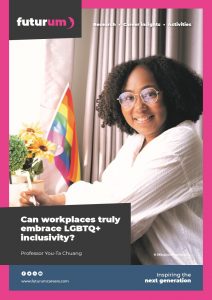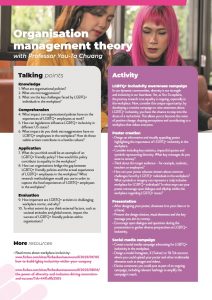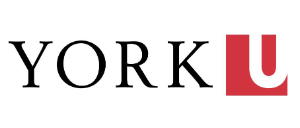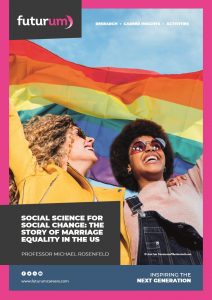Can workplaces truly embrace LGBTQ+ inclusivity?
Based at York University in Canada, Professor You-Ta Chuang is exploring intricate LGBTQ+ workplace dynamics and addressing key aspects such as the impact of organisational policies, the pervasive issue of microaggression and the role of activism in fostering a truly inclusive work environment.
Talk like an organisation management theorist
Heteronormative — a societal assumption that heterosexuality is the norm or ‘default’ sexual orientation
Heterosexism — systemic discrimination or prejudice against non-heterosexual orientations, reinforcing the idea that heterosexuality is superior or more valid
LGBTQ+ — lesbian, gay, bisexual, transgender, and queer/ questioning, with the plus symbol indicating inclusivity of other sexual orientations and gender identities
Microaggressions — subtle, often unintentional, discriminatory behaviours that marginalise individuals based on characteristics such as gender or sexual orientation
Organisational policies — rules set by an organisation to govern behaviour and practices
Imagine a workplace where everyone feels accepted, valued and understood. While this should be the norm, evidence highlights a disheartening reality: various groups in society face unfair stigmatisation in the workplace. Among these, perhaps one of the most profoundly stigmatised groups has been the LGBTQ+ community. Despite progress in societal attitudes, the workplace remains a battleground for LGBTQ+ individuals striving for acceptance and equality. Even though global acceptance of homosexuality has seen an upward trend in the past two decades, a study by The Canadian Press published in 2022 indicated that 65% of LGBTQ+ employees in Québec, Canada, had experienced workplace discrimination in the previous five years. This contrast between the increased tolerance towards LGBTQ+ individuals in broader society and the workplace reality highlights a significant disconnect that demands attention.
Professor You-Ta Chuang, Professor of Management at York University, opens a window onto the challenges faced by LGBTQ+ individuals in the workplace. From decoding the impact of organisational policies to navigating the nuances of microaggressions, his research uncovers crucial insights that influence the development of an inclusive work environment.
How important are organisational LGBTQ+ policies?
Organisational policies are a set of rules established by a company to guide how it operates. These policies cover a wide range of areas, including employee behaviour, workplace conduct, and the overall culture within the organisation. They serve as a framework to ensure that everything is fair and follows the law. These policies have profound influence on the experiences of LGBTQ+ employees at work. “Legislations, sometimes ambiguous and in contradiction with one another or across local and national levels, can be subject to varied interpretation,” says You-Ta. For example, before 2020, there was no legal protection at the federal level in the US against discrimination based on sexual orientation. This legal gap allowed different US states to set their own requirements, reflecting a patchwork of policies that affected the degree to which LGBTQ+ employees received equal treatment in different regions.
“Quite often, the state only indicates the minimum requirement that organisations need to comply with,” says You-Ta. “Therefore, the extent to which organisations will embrace equal treatment of LGBTQ+ employees is subject to their management’s political ideology and willingness to create a truly inclusive work environment.” Some organisations with more progressive political ideology actively adopt LGBTQ+ friendly policies, demonstrating a commitment to diversity. However, some organisations with more conservative political ideology may only meet minimum legal requirements, possibly perpetuating discrimination. Consequently, the lack of a standardised approach highlights the crucial role organisational policies play in determining the extent to which LGBTQ+ individuals are valued and protected in their professional environments.
What role do LGBTQ+ activists play in challenging workplace norms?
LGBTQ+ activists play a pivotal role, actively working to fight discrimination and fostering more inclusive workplace environments. “Our research shows that LGBTQ+ employee activists work with people who are more open-minded or supporters of LGBTQ+ and have more power and influence in their organisations to acquire resources to advocate for equal treatment,” says You-Ta. In doing so, they not only confront discriminatory practices but also collaborate with like-minded individuals in influential positions to promote equality.
Activists work hard to reshape workplace dynamics. “LGBTQ+ activists also take various opportunities to educate employees and managers to help them understand varied forms of discrimination and microaggressions and their effects on LGBTQ+ employees,” explains You-Ta. Their dedication extends to supporting LGBTQ+ rights through various approaches, from openly challenging discriminatory policies to subtly expressing their identities. It is through these combined efforts that LGBTQ+ activists contribute significantly to fostering environments where individuals can thrive.
How do microaggressions affect LGBTQ+ employees?
Microaggressions convey negativity towards individuals based on their sexual orientation, gender identity or expression. “Examples of microaggressions include assuming sexual orientation based on appearance, not inviting LGBTQ+ employees to social gatherings, assuming each employee is heterosexual, or expressing negative or hostile comments toward LGBTQ+ populations,” explains You-Ta. These sometimes seemingly insignificant actions can contribute to a hostile workplace culture if left unaddressed, creating an environment where LGBTQ+ individuals may feel marginalised or excluded.
“More specifically, microaggressions prevent LGBTQ+ employees from participating fully in the workplace and undermine their identities,” says You-Ta. These acts are rooted in heteronormative assumptions and workplace cultures that do not value LGBTQ+ identities. You-Ta based his research on workplaces in Canada and Taiwan. Despite these countries’ progressive and LGBTQ+ friendly reputations, his studies uncovered high frequencies of microaggressions experienced by LGBTQ+ employees. These were proven to be more detrimental than explicit discriminatory policies, affecting identities, well-being and job performance. Consequently, LGBTQ+ employees, confronted with microaggressions, tend to hide their identities, further promoting a culture of silence.
Reference
https://doi.org/10.33424/FUTURUM472
LGBTQ+ activists play a pivotal role, actively working to fight discrimination and fostering more inclusive workplace environments.
© Mongkolchon Akesin / Shutterstock.com
© DKikujiarm / Shutterstock.com
Organisation management theorists explore the intricacies of human behaviour within organisational structures.
© LightField Studios /Shutterstock.com
Taiwan Tongzhi Hotline Association (www.hotline.org.tw/english) was founded in 1998 and is now the oldest LGBTQ+ organisation in Taiwan
However, despite challenges, there may be a silver lining. “Fortunately, microaggressions sometimes trigger LGBTQ+ employees to stand up against interpersonal discrimination to fight for changes in workplace heterosexism,” says You-Ta. Addressing microaggressions requires a holistic approach, including diversity education, safe spaces and channels for voicing concerns. Despite direct supervisors’ crucial roles, LGBTQ+ individuals, especially transgender employees, often receive inadequate support, exposing inclusivity gaps. Achieving truly inclusive workplaces demands real commitment to diversity and inclusion at all levels.
What impact do LGBTQ+ policies have on workplace experiences?
“In the past, organisations hesitated to implement LGBTQ+ friendly policies due to concerns about costs and backlash from anti-LGBTQ+ social groups,” says You-Ta. Recent realisations debunk these fears, as studies indicate these policies enhance productivity, well-being and trust in management. “However, the impact of organisational LGBTQ+ friendly policies on employees is often dependent on how employees interpret the reasons why their employers implemented the policies,” explains You-Ta. It is important that policies are implemented to benefit people, not just for image enhancement or legal compliance. While LGBTQ+ friendly policies can boost job satisfaction and performance, for them to really work, the organisation must be truly committed to equality. Policies put into place just for appearance or to ‘tick a box’ may not produce real benefits. In contrast, organisations actively incorporating policies into daily operations, fostering LGBTQ+ participation in corporate functions and sponsoring events demonstrate a genuine commitment to equality, potentially leading to more positive impacts on employees.
Thinking about the future
“My current and future research tries to understand the conditions under which LGBTQ+ employees would stand up to change discrimination and microaggressions in the workplace,” says You-Ta. “Importantly, to truly embrace equal treatment for LGBTQ+ employees, all employees need to buy into the idea of diversity, equity and inclusion”. Only through this unified effort can workplaces truly become inclusive environments, fostering the well-being and success of LGBTQ+ employees. As we move forward, it is vital for organisations to recognise that a genuine commitment to diversity extends beyond policies; it involves cultivating a culture where everyone feels valued, respected and empowered, regardless of their sexual orientation, gender identity or expression.
 Professor You-Ta Chuang
Professor You-Ta Chuang
Professor of Management, School of Administrative Studies, York University, Toronto, Canada
Field of research: Organisation management theory
Research project: Investigating LGBTQ+ inclusivity in the workplace
Funder: Social Sciences and Humanities Research Council of Canada (SSHRC, grant #890-2021-0032)
About organisation management theory
Organisation management theory is a multifaceted field centred on exploring the intricacies of human behaviour within organisational structures. Researchers investigate why individuals, from employees to managers to senior executives, behave the way they do within an organisational context such as their workplace. “I am always curious about why people do what they do,” says You-Ta.
This discipline navigates the ever-evolving landscape of organisational challenges, requiring adaptability to changes in societal values, emerging technologies and environmental concerns. Consequently, organisation management theory plays an important role not only in structuring businesses but also helping leaders make important decisions. “I find doing research in organisation management theory rewarding because it answers my curious questions and stimulates more curiosity,” says You-Ta. The field is fascinating because it empowers professionals to actively participate in or react to global changes.
“Faced with ever-rapid changes in our world (such as changes in societal values, the emergence of artificial intelligence, changes in geopolitical landscape, and climate changes), there are lots of research opportunities to understand how organisations either actively participate in or passively react to these changes,” explains You-Ta. Research opportunities lie in understanding successful strategies for navigating these changes and how they affect things like leadership, organisational structure and workforce dynamics. This knowledge can help organisations become more resilient in the face of challenges.
Pathway from school to organisation management theory
“Organisation management theory is about the interplay between people, organisations and society,” explains You-Ta. “Subjects such psychology, sociology, economics and political sciences are very helpful”.
Reach out to local businesses, non-profit organisations and research institutions that align with management and organisational theory. They might offer internship opportunities or the possibility of shadowing professionals in the field.
Pursue a bachelor’s degree in sociology, business management or economics. Specialised courses like organisational theory and business operations would be very valuable.
Explore careers in organisation management theory
“To pursue a career in organisation management theory, you need to have critical thinking skills and curiosity about human behaviour and business operations,” explains You-Ta.
“Reading daily business news such as the Financial Times, the Wall Street Journal, the New York Times, Fortune, and the Times can be very helpful,” says You-Ta. These sources provide a comprehensive understanding of current business trends, economic analyses and global affairs. Reading articles on these
platforms can expose you to diverse perspectives, industry insights, and real-world applications of organisation management theory.
“Articles from the Harvard Business Review, the California Management Review, and the Sloan Management Review can also sharpen your critical thinking skills and advance your knowledge,” says You-Ta.
Indeed.com provides a career guide for different types of management theory.
Meet You-Ta
What inspired you to become an organisation management theorist?
Before getting into organisation management theory, I was trained as a clinical psychologist and provided psychological counselling for six years. I also worked in a big corporation for two years and helped my parent’s family business for several years. As I am always fascinated by human behaviour and how people interact with each other, I was intrigued by organisation management theory when doing my graduate studies and decided to pursue it as my career.
What experiences have shaped your career and research?
One of the most important eureka moments I’ll never forget occurred during my second year of undergraduate studies. I was fascinated by very interesting materials taught by my professor, Nai-Wen Kuo. In one lecture, she explained why some people don’t see objects on their left side. It is not because they don’t want to pay attention to the left. It is because their impaired cognition made them neglect the left. It opened my eyes to human behaviour and made me realise that there are different factors leading to the same behavioural outcomes. This makes the understanding of human behaviour both challenging and intriguing. Since then, I have been interested in exploring diverse human behaviours and interactions in different contexts.
What are your proudest career achievements?
So far, my career has been quite smooth, without many hiccups! I have published research in prestigious management journals and received good teaching evaluations. I especially enjoy and am proud of having the freedom to do what I want to do.
What are your aims for the future?
My goals for the future are to produce more impactful research, on LGBTQ+ issues in particular, and to help organisations create more LGBTQ+ friendly, truly diverse and equal work environments.
You-Ta’s top tips
1. Be sensitive and curious about your surroundings.
2. Always ask why and how things happen.
3. Read broadly to gather diverse perspectives.
Do you have a question for You-Ta?
Write it in the comments box below and You-Ta will get back to you. (Remember, researchers are very busy people, so you may have to wait a few days.)











0 Comments